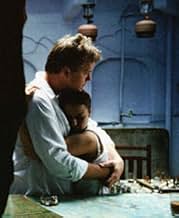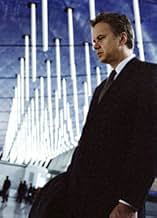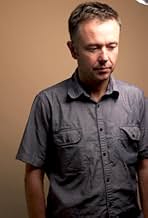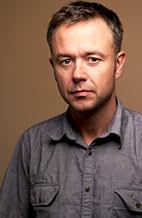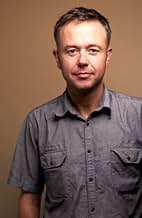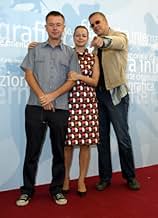NOTE IMDb
6,1/10
22 k
MA NOTE
Une brève rencontre futuriste (1945) ; une histoire d'amour vouée à l'échec pour cause d'incompatibilité génétique.Une brève rencontre futuriste (1945) ; une histoire d'amour vouée à l'échec pour cause d'incompatibilité génétique.Une brève rencontre futuriste (1945) ; une histoire d'amour vouée à l'échec pour cause d'incompatibilité génétique.
- Réalisation
- Scénario
- Casting principal
- Récompenses
- 4 victoires et 10 nominations au total
Taro Bahar
- Jim
- (as Taro Sherabayani)
Avis à la une
Code 46 is a film that puts its heart ahead of its head. Fortunately there are times when I can cherish such an endeavour so it worked for me, but I'm not the sort of viewer to tune out my head entirely so it didn't entirely work. For a plot, we have an fraud investigator in a dystopian future falling for his chief suspect. There's romance and plot developments, but the romance is key, the film is a study in wistful mood over and above its narrative. The driving force is the sparking of love in a time of such uncertainty it seems near impossible, a future of uncertain (and perhaps dangerous) genetic identities and instant personality alterations. A time in which mankind has gone so far with genetic experimentation that intrusive legislation and rigid border controls are the governments only tool to keep things under control, with Tim Robbins as or protagonist working to do just that. Now the above might give the impression of science fiction intrigues in a distant new world, but the design is modern with little visually (apart from a pretty awesome road junction) to set it apart from our world, generally conversation and some cold interior designs are what creates its sense of future. As for intrigue, well this gets us to the trouble with the film. Thematically, the potential is high, but by and large the issues are little more than brought up and laid down, if brought up at all. So no serious delving into the moral and biological consequences of events, nor the problems raised by personality alteration viruses, nor even much of a process of realisation/rebellion by our lead. What's there instead is charm, a gentle look at quiet, irresponsible burgeoning romance, deftly essayed by the leads and buttressed by sweet presentation. Tim Robbins does well in suggesting a questing soul beneath a smiling, sincerely insincere exterior, while Samantha Morton is a delight as the object of his affections. With hair cut short and a childlike naiveté she near shimmers in other-world loveliness, a truly likable turn. They have fine chemistry too, so their relationship is a fine one to ride with, much aided by the cinematography and score. Some places look suitably sterile here, but a lot of places are shot with soft, dreamhaze hues as if coming to from a medicated slumber, fitting to the plot. The music, mostly from The Free Association is wistful and shoegazey, again appropriate. The ending does however really spoil the mood established by the wordless score by employing a Coldplay song. I'm probably biased because I loathe Coldplay anyway but even taking that into account I don't think any vocals would really have suited the end of this one. I'm in danger of selling this one perhaps more than it truly deserves, but I did like it a lot. The lack of substance is a big drawback, but maintains a near constantly pleasing tone even if I wasn't thinking much about it after viewing. 7/10 from me, one for romantics methinks.
I liked how the movie didn't scream at me, trying to deafen me with whatever kind of message the actors and director wanted to convey... I had to work a little bit to see what there was to be seen - which I like, and I found the lack of CGI and laser guns thoroughly refreshing. The pace was right, and the music fit the mood of the movie.
The movie as a whole has a distinct human quality like I used to enjoy in those 50's sci-fi stories the way Philip K. Dick could write them. The same atmosphere that's usually gone in Dick's flashy Hollywood rewrites.
The intercultural lingo is a lot of fun to listen to, it's not too tacky and not too overdone, it sounds almost natural to me.
All in all a good 8 out of 10 stars from me. If there was more of a puzzle to be solved throughout the film (it does have you wonder where things are going in the beginning) I would have probably rated it even higher, because I like my stories a little mysterious and not too straightforward. I can imagine that some people find the acting slightly too bland for their tastes, but I feel it's far better to err on the side of caution than to produce another vehicle for overacting and improbable characters.
The movie as a whole has a distinct human quality like I used to enjoy in those 50's sci-fi stories the way Philip K. Dick could write them. The same atmosphere that's usually gone in Dick's flashy Hollywood rewrites.
The intercultural lingo is a lot of fun to listen to, it's not too tacky and not too overdone, it sounds almost natural to me.
All in all a good 8 out of 10 stars from me. If there was more of a puzzle to be solved throughout the film (it does have you wonder where things are going in the beginning) I would have probably rated it even higher, because I like my stories a little mysterious and not too straightforward. I can imagine that some people find the acting slightly too bland for their tastes, but I feel it's far better to err on the side of caution than to produce another vehicle for overacting and improbable characters.
First of all I was impressed by the moody shots of Shanghai and the other locations used. Almost had that Blade Runner feel for planting you in a believable future. So many films of this genre, and with massively higher budgets, often fail to achieve the lightness of touch shown here. Not the usual obviously nailed-on FX, but instead subtle and credible gizmos with the personalised touch, like Maria's cuckoo-call tone and graphics on her personal organiser that William uses when trying to find her. And the Esperanto-style combination of phrases everyone uses, from Spanish, French, Chinese etc could easily be envisaged in years to come.
But what really let it down ultimately was the story. Just at the point where you wanted the narrative to move up a gear, instead it just hung there and became a bit self-indulgent. The actors made an excellent job of an often dull script. Maybe the writer couldn't think how to end it. A shame, as it was an opportunity squandered in my opinion.
I got the feeling that Frank Cottrell Boyce, though coming up with some thought - provoking ideas in this film and having done excellent work elsewhere, possibly needed to have collaborated with another writer that could have injected some pace and fresh perspective just at the point the film ran out of steam. I'm a great fan of Michael Winterbottom's (especially on "Jude")evocative and atmospheric camera-work, but that alone couldn't salvage the film from ultimately being disappointing.
But what really let it down ultimately was the story. Just at the point where you wanted the narrative to move up a gear, instead it just hung there and became a bit self-indulgent. The actors made an excellent job of an often dull script. Maybe the writer couldn't think how to end it. A shame, as it was an opportunity squandered in my opinion.
I got the feeling that Frank Cottrell Boyce, though coming up with some thought - provoking ideas in this film and having done excellent work elsewhere, possibly needed to have collaborated with another writer that could have injected some pace and fresh perspective just at the point the film ran out of steam. I'm a great fan of Michael Winterbottom's (especially on "Jude")evocative and atmospheric camera-work, but that alone couldn't salvage the film from ultimately being disappointing.
In the near future, Tim Robbins is sent to investigate a case of forged passports. This Orwellian government has strict control over everything. Unfortunately for Tim, he falls in love with a girl with whom he is not DNA-compatible, a violation of code 46.
Code 46 is derivative of course but ultimately it is fresh cinema, and there are several sub themes about science and morality to think about.
Most unique, i thought, was its vision of Shanghai where it seems only half the people are Asian, and everyone speaks English with just a few fundamental phrases from mandarin and Spanish. I am guessing that demographics and language are both controlled by the government. Incidentally, the classic book/movie Clockwork Orange showed a anarchistic world where English developed chaotically into a Russian mix as that was its geopolitical vision.
There are few great science fiction movies, i think this one is close to being great but in the end I think it lacked drama. But if you like science fiction, you will love this.
Code 46 is derivative of course but ultimately it is fresh cinema, and there are several sub themes about science and morality to think about.
Most unique, i thought, was its vision of Shanghai where it seems only half the people are Asian, and everyone speaks English with just a few fundamental phrases from mandarin and Spanish. I am guessing that demographics and language are both controlled by the government. Incidentally, the classic book/movie Clockwork Orange showed a anarchistic world where English developed chaotically into a Russian mix as that was its geopolitical vision.
There are few great science fiction movies, i think this one is close to being great but in the end I think it lacked drama. But if you like science fiction, you will love this.
'Code 46' is the most beautiful film I've seen in quite some time. It's funny how something entirely new is produced when the properties of film noir and futuristic sci-fi are married. Like 'Until the End of the World,' 'Strange Days,' and 'Gattaca,' three films which 'Code 46' potently recalls, this is above all else a mood piece, wherein character and plot are secondary to the drifty, elegiac flow of the film.
The action is underplayed, and the performances have an earthy tone; Tim Robbins recalls William Hurt in 'Until the End of the World' and Bill Murray in 'Lost in Translation,' in that his perpetual jet lag has cultivated an easy, weary charm. The movie is set, one gathers, in the future (or an "alternative present," to paraphrase another reviewer). Like the best futuristic films, it's set on the same planet Earth, but the planet's simply been restructured; the old occupants have left and the new ones have moved in. No longer are there countries, only cities, only business destinations.
Pleasure is not a goal, but a side effect. The locations photographed are, as in 'Alphaville,' as in 'Sans Soleil,' not manipulated or artificial, but they are photographed in a new way. Contemporary cities look futuristic, commercial, busy, cold, with pools of dark glass and beads of light from skyscraper windows. For me, this kind of imagery is the among the most romantic and evocative. Cold, impersonal environments like these simultaneously forbid and necessitate human warmth. Intimacy becomes something to escape into.
Michael Winterbottom and his screen-writing partner Frank Cottrell Boyce have done great work before, and inevitably, a lot of viewers and critics are dismissing 'Code 46' as a number of things, including listless and convoluted, but I think that's symptomatic of approaching this film with the wrong expectations. Far beyond simply being a trivial footnote in what will hopefully be a career of formidable longevity, I think 'Code 46' is perhaps Winterbottom's best work yet, the movie I intuited Winterbottom had dormant in him. The movie has a sort of purging effect, like Wenders' 'Until the End of the World,' and as with that film, my immediate environment felt different to me, changed, upon exiting the theater.
The action is underplayed, and the performances have an earthy tone; Tim Robbins recalls William Hurt in 'Until the End of the World' and Bill Murray in 'Lost in Translation,' in that his perpetual jet lag has cultivated an easy, weary charm. The movie is set, one gathers, in the future (or an "alternative present," to paraphrase another reviewer). Like the best futuristic films, it's set on the same planet Earth, but the planet's simply been restructured; the old occupants have left and the new ones have moved in. No longer are there countries, only cities, only business destinations.
Pleasure is not a goal, but a side effect. The locations photographed are, as in 'Alphaville,' as in 'Sans Soleil,' not manipulated or artificial, but they are photographed in a new way. Contemporary cities look futuristic, commercial, busy, cold, with pools of dark glass and beads of light from skyscraper windows. For me, this kind of imagery is the among the most romantic and evocative. Cold, impersonal environments like these simultaneously forbid and necessitate human warmth. Intimacy becomes something to escape into.
Michael Winterbottom and his screen-writing partner Frank Cottrell Boyce have done great work before, and inevitably, a lot of viewers and critics are dismissing 'Code 46' as a number of things, including listless and convoluted, but I think that's symptomatic of approaching this film with the wrong expectations. Far beyond simply being a trivial footnote in what will hopefully be a career of formidable longevity, I think 'Code 46' is perhaps Winterbottom's best work yet, the movie I intuited Winterbottom had dormant in him. The movie has a sort of purging effect, like Wenders' 'Until the End of the World,' and as with that film, my immediate environment felt different to me, changed, upon exiting the theater.
Le saviez-vous
- AnecdotesCode 46 refers to the twenty-two chromosome pairs, plus the two sex chromosomes in human beings.
- GaffesThe numerous seeming "errors in geography" are actually an intentional artistic choice. Because the film is set in a future where global cultures have become thoroughly merged, Michael Winterbottom purposely blended footage shot in Shanghai, Dubai and Rajastahn so that Shanghai has a desert outside it, etc.
- Crédits fousThere is a looped animation running next to the names during the final credits. It shows a variety of things, including chromosomes, chromosome replication, and chemical structures.
- Bandes originalesNo Man's Land
Written by David Holmes
Published by Universal/Island Music Ltd
Performed by David Holmes
Courtesy of Polydor UK Ltd
Licensed by kind permission from the
Universal Film and TV Licensing Division
Meilleurs choix
Connectez-vous pour évaluer et suivre la liste de favoris afin de recevoir des recommandations personnalisées
- How long is Code 46?Alimenté par Alexa
Détails
- Date de sortie
- Pays d’origine
- Site officiel
- Langue
- Aussi connu sous le nom de
- Kod 46
- Lieux de tournage
- Sociétés de production
- Voir plus de crédits d'entreprise sur IMDbPro
Box-office
- Budget
- 7 500 000 $US (estimé)
- Montant brut aux États-Unis et au Canada
- 285 585 $US
- Week-end de sortie aux États-Unis et au Canada
- 20 170 $US
- 8 août 2004
- Montant brut mondial
- 886 018 $US
- Durée
- 1h 33min(93 min)
- Couleur
- Mixage
- Rapport de forme
- 2.35 : 1
Contribuer à cette page
Suggérer une modification ou ajouter du contenu manquant


